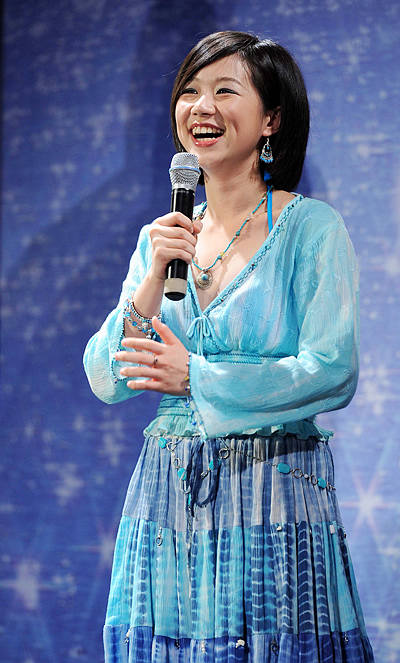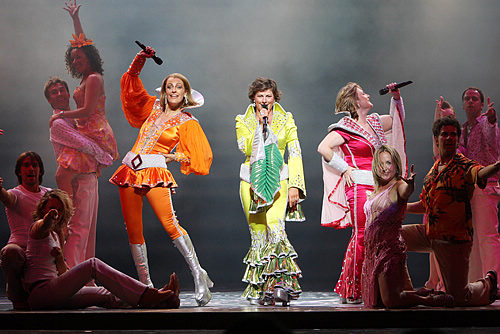|
 |
|
SWEET DAUGHTER: Zhang Fangyu, the actress in the role of Sophie, meets the media in Beijing in June (CFP) |
"Technologically speaking, Mamma Mia! has been far more difficult than any other musicals of similar scale in China," said Liao Weihan, technical director of the Chinese version. "Although it only has two acts, there are 25 scene changes. On average, the scene changes every five to eight minutes. The hotel on the Greek island, which weighs 200 kg, will be dragged on to and off stage 10 times."
In order to retain the original flavor of the classic musical, the technical team executes each detail to international standard.
Essential stage equipment has been imported from Australia; the stage curtain specially ordered from Britain; the costumes of actors are produced in France; the light and audio equipment is provided by South Korea. Chinese audiences are in for a Broadway-level visual and auditory experience.
"The stage cost more than 10 million yuan ($1.5 million) to build, and it took 100 technicians from China, Britain and South Korea a week to complete," said Liao.
"From what I saw in the rehearsal, the stage design and costumes of the actors are almost the same as the original version that I saw in New York. The atmosphere is very close to that as well," said Dai Zhongwei, who has participated in creating many original musicals.
No matter what country it is performed in and in what language, Mamma Mia! always uses the best local stage musical actors. The Chinese version is not an exception.
The main characters of the musical were carefully selected after half-a-year's consideration.
The heroine Donna, which is the most important role, is played by Tian Shui, an actress from the Shanghai Drama Art Center. She is the laureate of the White Magnolia Award for her outstanding performance, and the Cao Yu Drama Award. Years of accumulated acting experience made her the most suitable candidate for Donna. Her audition for the part won her the selective director's praise.
More than 1,000 young women competed for the part of Sophie. In the end, Zhang Fangyu, a girl from Taiwan, won the part as all members of the direction team thought she had a clear and bright voice and sweet appearance, quite in accordance with the role.
"Before watching it, I highly doubted this version. But after watching the first half of the show, I'm totally impressed by their performance," said Ye Zi, a student of Shanghai Conservatory of Music majoring in music, after watching one of nine preview shows in Shanghai.
 |
|
FIRST SHOW: The English-language version of Mamma Mia! being rehearsed for its debut in China on July 5, 2007 (CFP) |
The Chinese element is another highlight of the musical. For instance, on the night before the wedding, eight friends of Sophie's fiancé come to make fun of the couple. They have to attract her attention as much as possible.
"This scene has 14 different versions around the world," said Leah Sue Morland, dance director of the musical. "No matter in what country, we will ask actors to perform the most characteristic local dances, such as flamenco in Spain."
"In China, there will be traditional yangge and ethnic dances such as in Xinjiang Uygur Autonomous Region, Tibet Autonomous Region and Inner Mongolia Autonomous Region. Also, they add voices as Bruce Lee in scenes to add more humor to the musical," said Morland.
In Shanghai, some lines were spoken in local dialect, bringing immediate applause and laughter from audiences. | 